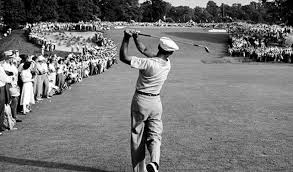In the world of sports, there are legends and then there are game-changers. Ben Hogan belongs to the latter category. A man of few words but unmatched influence, Hogan wasn’t just one of the greatest golfers in history; he was a quiet revolutionary whose legacy reshaped the very way the game is taught, played, and understood.
From Adversity to Aspiration
Born in Stephenville, Texas, in 1912, Ben Hogan’s journey to golf stardom was anything but glamorous. His father tragically died by suicide when Ben was just nine years old a trauma that haunted him throughout his life. Growing up in poverty, he took up caddying at Glen Garden Country Club to help support his family. It was there that he was first introduced to the game that would define his life.
Hogan turned professional at age 17, but success did not come quickly. Throughout the 1930s, he struggled to earn a living on tour, even contemplating quitting the sport altogether. However, it was his relentless work ethic and belief in self-discipline that kept him going. By 1940, he broke through with his first PGA Tour win the start of a career that would ultimately redefine excellence in golf.
The Relentless Pursuit of Perfection
What set Hogan apart from his contemporaries was not just his skill, but his analytical approach to the game. He treated golf as both an art and a science. Where other players relied on instinct, Hogan relied on geometry, physics, and repetition. He was often the first to arrive at the course and the last to leave, famously hitting thousands of practice balls until his hands were blistered and bleeding.
Hogan’s swing was a marvel of precision. Compact, controlled, and mechanically sound, it became the gold standard in golf. His 1957 book, “Five Lessons: The Modern Fundamentals of Golf,” is still regarded as one of the most influential instructional guides in the sport. To this day, players and coaches study Hogan’s techniques to understand how to achieve consistency and control in their game.
The Car Crash That Changed Everything
In 1949, Hogan’s career and life nearly came to a tragic end. While driving with his wife, Valerie, in West Texas, their car collided head-on with a Greyhound bus. Hogan threw himself across his wife to protect her, an instinct that saved both their lives. But the injuries were devastating: a double fracture of the pelvis, a broken collarbone, a broken ankle, and near-fatal blood clots.
Doctors doubted he would walk again, much less return to professional golf. Yet, against all odds, Hogan did exactly that. Just 16 months after the accident, he made an improbable return to the PGA Tour and won the 1950 U.S. Open at Merion a performance now etched in golf folklore as the “Miracle at Merion.” It wasn’t just a comeback; it was a triumph of human will.
The Hogan Mystique
Hogan’s personality only added to his mystique. He was famously introverted, rarely giving interviews and often described as aloof or distant. But those close to him knew it wasn’t arrogance it was focus. He didn’t play to entertain. He played to master the game, to win, and to honor the sport through discipline and excellence.
He was known to prepare for tournaments with military precision, walking courses alone to map out every shot in his head. This level of preparation and mental toughness became a model for future generations, including greats like Jack Nicklaus and Tiger Woods, who both cite Hogan as a key influence.
Legacy and Lasting Impact
Hogan won 64 PGA Tour events, including nine major championships four U.S. Opens, two Masters, two PGA Championships, and one Open Championship. But his true legacy isn’t just in trophies. It’s in the way he elevated golf from a gentleman’s pastime to a highly technical and mentally demanding sport.
He showed that greatness wasn’t born it was built. Through adversity, injury, and personal pain, Hogan constructed a legacy on grit and perfection. The “Hogan Fade,” his swing theories, and his relentless work ethic continue to shape how golf is taught and played around the world.
The Quiet Architect of Modern Golf
Ben Hogan never sought the spotlight. He didn’t need to. His performance, perseverance, and principles spoke volumes. In a world increasingly obsessed with charisma and celebrity, Hogan’s career reminds us that true greatness often resides in humility, silence, and unshakable discipline.
He didn’t just play the game he mastered it. And in doing so, Ben Hogan forever changed golf.

